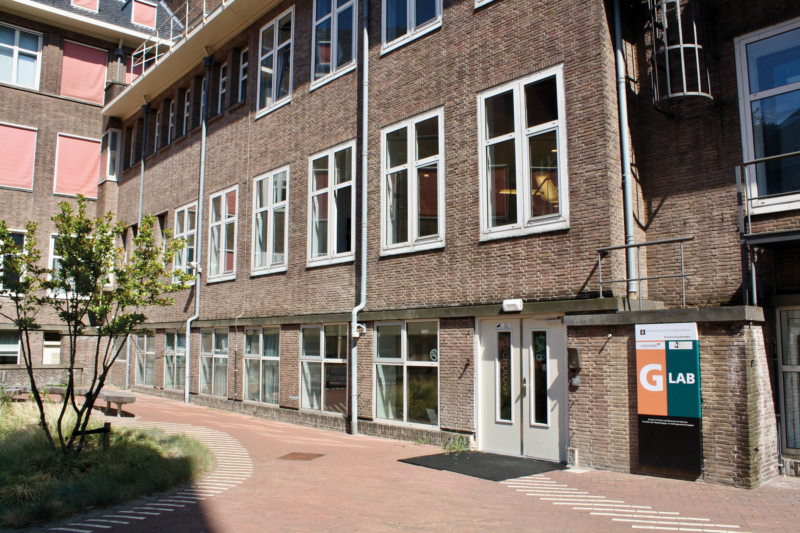

What is it about the Dutch and data? The Dutch obsession with measuring things has been something of a thorn in my side over the years. For example, when I used to measure online marketing activity for a living, our first competitor was a Dutch company. Now that I live in the Netherlands, I seem to be receiving regular measurements of my driving speed from the Dutch government. But it’s not just the police that are providing me with regular feedback on my performance here; the UvA does it too by having exams every four weeks. All of this measuring seems to have become something of a threat to my personal, as well as financial, wellbeing.
Reducing my speeding tickets simply requires me to comply with my state-sponsored behavioural therapy but improving my exam results appears to be not so straightforward. I say this because, despite maximum effort, I only scraped a pass in Developmental Psychology. Like many other students, I was unhappy to have been given an exam that didn’t reward my hard work. Once I had recovered from the initial shock, I was surprised by the extent to which my motivation suffered as a result. Perhaps this can be explained by expectancy theory, which states that motivation depends on the degree to which working harder leads to better outcomes (your effort-to-performance expectancy). The Developmental Psychology exam differed from the previous exams because the marks for open-ended questions increased five-fold. Open-ended questions test knowledge more deeply, which means the material needs to be studied more thoroughly. I did not feel it would be possible for me to deep-learn all of the contents of fourteen lectures, a 745-page textbook and two literature reviews in four weeks. My study strategy was based on my theory that, in order to be fair, a good proportion of the open-ended questions would be from material presented by the principal lecturer. The reality was the complete opposite, with the guest lecturers providing the content for most of these questions. My strategy of reading the open-ended questions first also backfired, and there is nothing worse for cognitive performance than the runaway stress levels I experienced as a result. My fight-or-flight response was in full effect, literally. I spent a good five minutes contemplating the logistical consequences of walking out and trying my luck for a retake.
There are not many things I find more stressful than being in an unpredictable situation, and it was the possibility of a four weekly repeat that was not filling me with enthusiasm. To reduce this stress, I decided to do a mini research project to put some evidence-based pressure on the faculty. Over forty students filled in my survey and, as expectancy theory predicts, feeling happy and well motivated correlated positively with the feeling that if you work hard, your efforts will be rewarded. While finding the course too stressful did indeed correlate with reduced motivation, this effect was moderated significantly for those who felt like they had a voice. It did not feel as though we had much of a voice when, despite all of the complaints, the faculty went ahead and published the grades at the earliest opportunity. However, they did subsequently decide to modify the format of the Developmental Psychology exam to bring it in line with the other exams from next year onwards. I think this announcement helped put my mind at ease by restoring confidence that I have a voice.
I’ve always liked to let the numbers do the talking, perhaps that’s why I ended up living here. My love of numbers would seem a more interesting answer to this perennial question than my wife being Dutch. Just don’t mention the exams.

What is it about the Dutch and data? The Dutch obsession with measuring things has been something of a thorn in my side over the years. For example, when I used to measure online marketing activity for a living, our first competitor was a Dutch company. Now that I live in the Netherlands, I seem to be receiving regular measurements of my driving speed from the Dutch government. But it’s not just the police that are providing me with regular feedback on my performance here; the UvA does it too by having exams every four weeks. All of this measuring seems to have become something of a threat to my personal, as well as financial, wellbeing.
Reducing my speeding tickets simply requires me to comply with my state-sponsored behavioural therapy but improving my exam results appears to be not so straightforward. I say this because, despite maximum effort, I only scraped a pass in Developmental Psychology. Like many other students, I was unhappy to have been given an exam that didn’t reward my hard work. Once I had recovered from the initial shock, I was surprised by the extent to which my motivation suffered as a result. Perhaps this can be explained by expectancy theory, which states that motivation depends on the degree to which working harder leads to better outcomes (your effort-to-performance expectancy). The Developmental Psychology exam differed from the previous exams because the marks for open-ended questions increased five-fold. Open-ended questions test knowledge more deeply, which means the material needs to be studied more thoroughly. I did not feel it would be possible for me to deep-learn all of the contents of fourteen lectures, a 745-page textbook and two literature reviews in four weeks. My study strategy was based on my theory that, in order to be fair, a good proportion of the open-ended questions would be from material presented by the principal lecturer. The reality was the complete opposite, with the guest lecturers providing the content for most of these questions. My strategy of reading the open-ended questions first also backfired, and there is nothing worse for cognitive performance than the runaway stress levels I experienced as a result. My fight-or-flight response was in full effect, literally. I spent a good five minutes contemplating the logistical consequences of walking out and trying my luck for a retake.
There are not many things I find more stressful than being in an unpredictable situation, and it was the possibility of a four weekly repeat that was not filling me with enthusiasm. To reduce this stress, I decided to do a mini research project to put some evidence-based pressure on the faculty. Over forty students filled in my survey and, as expectancy theory predicts, feeling happy and well motivated correlated positively with the feeling that if you work hard, your efforts will be rewarded. While finding the course too stressful did indeed correlate with reduced motivation, this effect was moderated significantly for those who felt like they had a voice. It did not feel as though we had much of a voice when, despite all of the complaints, the faculty went ahead and published the grades at the earliest opportunity. However, they did subsequently decide to modify the format of the Developmental Psychology exam to bring it in line with the other exams from next year onwards. I think this announcement helped put my mind at ease by restoring confidence that I have a voice.
I’ve always liked to let the numbers do the talking, perhaps that’s why I ended up living here. My love of numbers would seem a more interesting answer to this perennial question than my wife being Dutch. Just don’t mention the exams.

